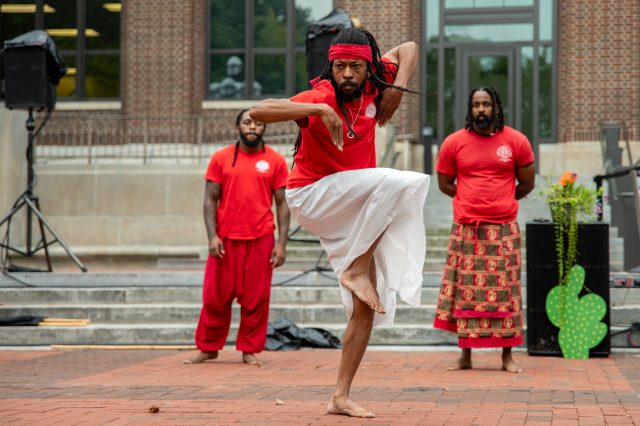[ad_1]
Booths lined the perimeter of the Diag and a podium flanked by cardboard cacti was placed on the steps of the Hatcher Graduate Library as Ann Arbor community members gathered for the fourth annual Entheofest. The theme of the festival centered around entheogenic substances, psychoactive substances derived from plants, such as psilocybin, that people take recreationally and medicinally. Preshow programming included a yoga session and abstract musical performance.
Social Work student Emily Berriman is the president of the Student Association for Psychedelic Studies, which helped organize Entheofest. Berriman said in an interview with The Michigan Daily that the event began as a commemoration of the decriminalization of entheogenic substances such as mushrooms.
“And now it’s just celebrating that anniversary and coming together as a community to learn about the research going on and the people involved in the psychedelic world,” Berriman said.
James Salame, an Entheofest committee planner, was the primary coordinator of the event. Salame said the organizers and participants of the festival wanted to promote awareness on the medicinal value of entheogenic substances.
“We’re here to celebrate plant medicine and mushrooms,” Salame said. “We’re here to educate, activate people and get people excited about these things.”
Jeanne DuPont is the founder and CEO of event sponsor the Gabbie Scheffer Foundation, which educates people about fentanyl and provides support for those impacted by the drug. DuPont echoed Salame’s point of view in an interview with The Daily.
“We’re spreading awareness about fentanyl, and we advocate for plant therapy,” DuPont said. “The studies have found that (plant therapy)helps with addiction, and I lost my daughter to fentanyl poisoning so … we’re just here to spread some awareness.”
State Sen. Jeff Irwin, D-Ann Arbor, spoke about his support of legislation that addresses entheogen decriminalization, including the introduction of a bill which has been referred to the Committee on Regulatory Affairs.
“Senate Bill 499, which I introduced last year, would mean that no one in the state of Michigan would have to go to jail for using entheogenic substances, for using plant medicine,” Irwin said. “This is what we need to be fighting for here in the state of Michigan.”
Irwin also noted in his speech that these plants have a very long history of use.
“We need to understand that these substances have been used beneficially for thousands of years,” Irwin said. “They have been very significant to human religious and cultural practices, and they have a very low propensity for abuse, and when you look at what they do physiologically, they’re not particularly harmful substances.”
Washtenaw County prosecutor Eli Savit, who took office in 2021, extended Ann Arbor’s entheogen decriminalization policy to the entirety of Washtenaw County. In his speech at Entheofest, Savit explained the reasoning behind his support of entheogen decriminalization.
“They’re not associated with increased risk of violence,” Savit said. “They’re nonaddictive. They’re actually associated with reduced intimate partner violence in men who take them. So why are we criminalizing these in the first place?”
George Mashour, professor of anesthesiology and pharmacology and founding director of the Michigan Psychedelic Center, spoke on current projects at the University of Michigan Medical School regarding psychedelic neuroscience and brain networks.
“There’s research going on across the campus from the … cellular level, questioning current paradigms of how psychedelics work in the brain,” Mashour said.
The Michigan Psychedelic Center’s new research investigates the connection between psychedelics, anesthetics and consciousness. According to Mashour, the purpose of these studies are to destigmatize psychedelic research and facilitate outreach.
“You induce this kind of mirror image state in the brain with anesthetics and psychedelics, and we’re seeing whether or not, essentially, they kind of neutralize one another,,” Mashour said.
Mashour advocated for balancing excitement about psychedelic research with caution around how the topic is discussed.
“I believe that we should not stigmatize psychedelic research, we should also not romanticize (it),” Mashour said. “We need to be courageous in this moment, and courageous in a different way that we might usually think about it.”
Daily Staff Reporter Nolan Sargent and Daily News Contributor Kaelyn Sourya can be reached at nsarge@umich.edu and ksourya@umich.edu.
Related articles
[ad_2]
Source link











